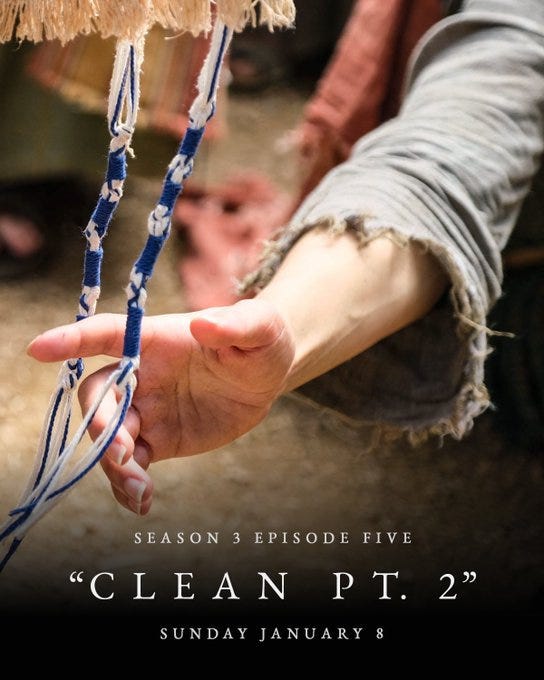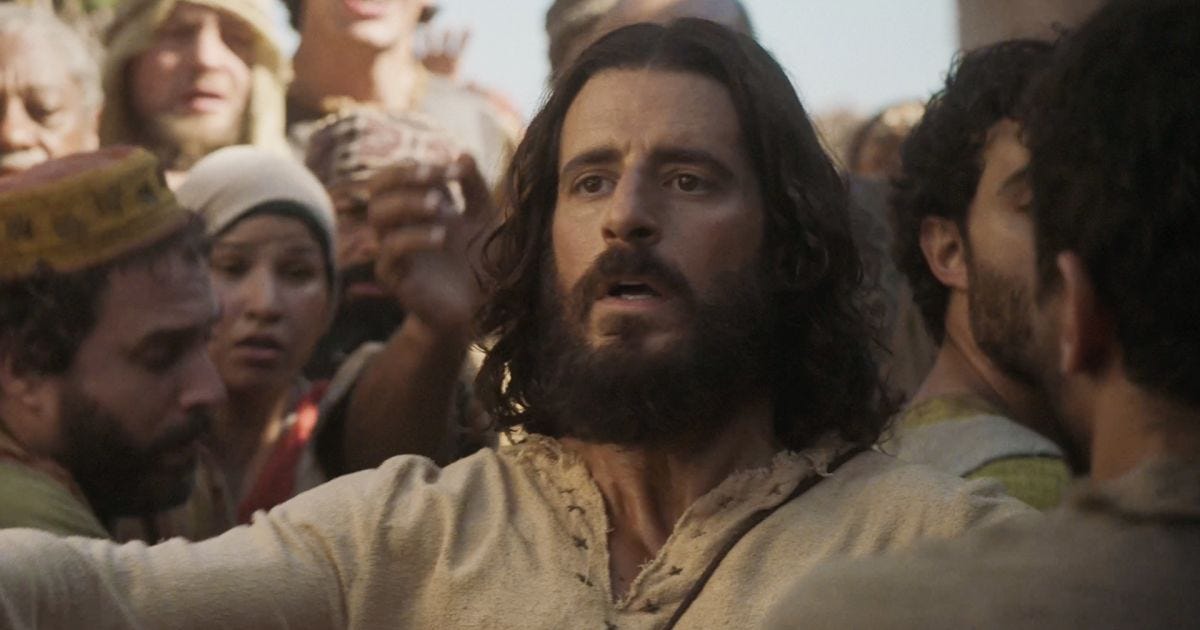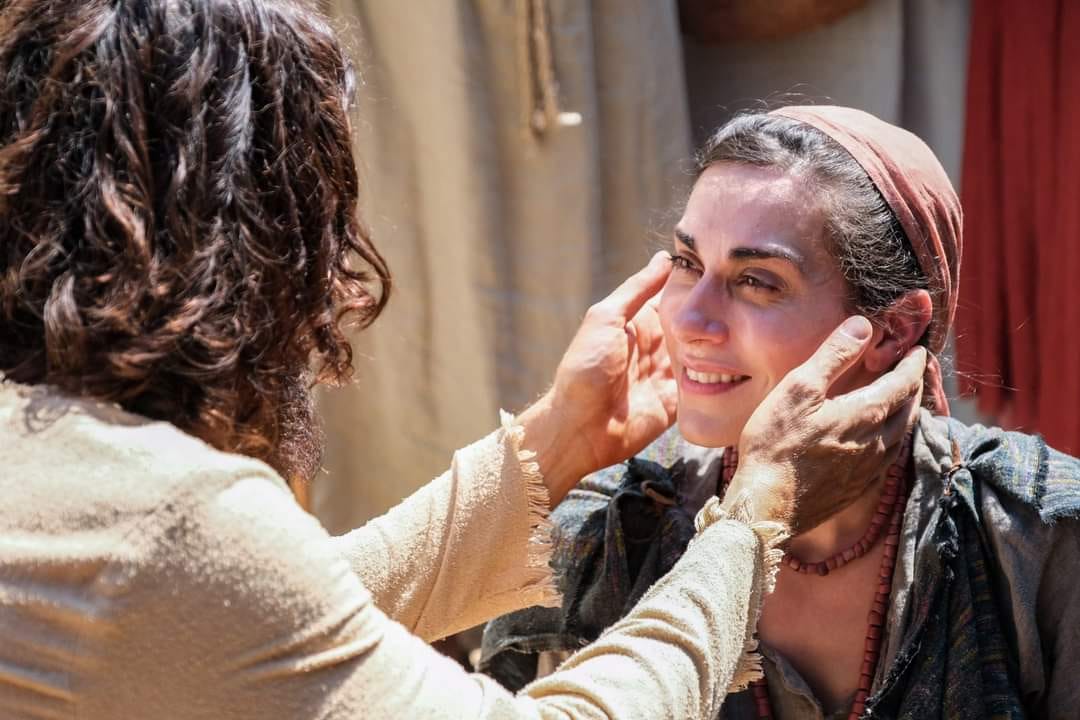Summary
Eden and her mother arrive in the dead of night at a local doctor’s home. Eden is very clearly in pain and the doctor rushes her inside. We quickly realize that she is pregnant and that she has miscarried. This scene then jumps forward to the present where this same doctor is examining Jairus’ daughter, whose breathing and heartbeat are growing weaker. The doctor tells Jairus that his daughter will not last much longer, and that he needs to begin preparations for her passing. Jairus tells the doctor not to make any preparations until she has died and sets off in a hurry.
Zebedee informs James and John that he has sold the fishing boat to buy an olive grove. James and John show concern at this news and ask Zebedee if he had to sell it because they are not around anymore due to their discipleship. Zebedee then confesses to the boys that he only ever fished to take care of his family and their neighboring families while he awaited the coming of the Messiah. Now that Jesus has come, Zebedee wishes to spend the rest of his days doing something he actually enjoys doing while also contributing financially to Jesus’s ministry. Judas then successfully negotiates the purchase of the olive grove.
Simon unsuccessfully tries to rectify his uneasy situation with Eden, but quickly gives up and heads off to repair the well with Gaius. Jairus asks Yusuf to take him to Jesus, as he believes Jesus can heal his daughter. As Jesus is teaching his disciples at Simon and Eden’s house, Yusuf and Jairus rush in and Jairus asks Jesus to heal his daughter. Jesus agrees and everyone leaves for Jairus’ home, although Eden is visibly upset seeing Jesus once again heal a stranger while seemingly ignoring her suffering. While finishing up work on the well, Gaius reveals to Simon that he and his wife are raising the son of their deceased servant, and after Simon mocks him in jest it is clear that something is troubling Gaius. They are interrupted when a crowd comes rushing by, saying that Jesus is on His way to perform another miracle. A large crowd quickly forms into a mob surrounding Jesus and slowing his way towards Jairus’ home. Thaddeus and Nathaniel arrive at the crowd with the bleeding woman Veronica, whom they found alone in the wilderness and have brought to Jesus to be healed.
Believing that she only needs to touch a piece of Jesus’s garment, she rushes forward through the crowd and brushes one of his tzitzit tassels. Jesus stops cold in his tracks as he feels power leave his body. Jesus asks who touched Him, and Veronica says that she touched the fringe of His garment and she has been healed. Yusuf begins to tell Jesus that He needs to perform ritual cleansing, but he is immediately rebuked by Jesus who emphatically states that Veronica is clean and that He needs no ritual cleansing. Jesus then asks the crowd to disperse so that He can make his way to Jairus’ daughter. He takes only James, John, Simon, and Yusuf with Him.
Upon arriving at Jairus’ home, a Pharisee tells Jairus that his daughter has passed. Jairus is distraught, telling the Pharisee that he went as fast as he could to find Jesus and that He would heal his daughter. Jesus tells Jairus not to fear, and to believe that He will make her well. Jesus enters the house and finds people wailing and weeping. He asks them what they are doing, and when they reply that a little girl has died Jesus tells them to go away and that she is not dead but sleeping. They laugh at Jesus and tell the Pharisee what Jesus has said, which angers the Pharisee. After Yusuf and the disciples escort everyone out of the house, they follow Jesus upstairs to the girl’s room. Jesus tells the girl to rise, and she instantly opens her eyes and stands up out of the bed. Jesus tells everyone present that they are to tell no one outside the room what happened under any circumstances.
As they leave the house, Jesus is confronted by the Pharisee who tells Him that He and anyone else who touched Him must go and perform ritual cleansing or he will send a letter to the Sanhedrin telling them what He has done. Jesus pretends to gather the disciples up for cleansing and takes them to the sea, where they find Veronica wading in the water. Veronica is concerned and asks Jesus if the Pharisee has sent them to perform cleansing. He comforts her, telling her that He is letting the Pharisee think that they are cleansing but are actually just there to swim. As Jesus and his disciples swim and play in the sea, Eden watches on, clearly in a state of emotional turmoil after witnessing Jesus heal Veronica and still not being able to tell Simon what has happened to her.
Megan’s Insight
Shame is a central theme in this episode, explored both in the storyline of Veronica and Eden. The episode opens with the heart-wrenching flashback scene of Eden’s miscarriage. We now understand the tension between Eden and Simon. She is carrying a tremendous cross and Simon has been unaware and unavailable to her. Shame is a common response in women who have experienced a miscarriage. Guilt is a negative feeling or emotion that we can have but shame takes that emotion a step further and corrodes our self-image. Shame is feelings of guilt wrapped up with a sense of failure and an understanding of not being good enough.
In first-century Jewish culture, both Eden and Veronica are considered ritually unclean given their circumstances. They are outsiders and bond over their shared shame and pain. Veronica has been experiencing this shame and societal rejection for years. The possibility of being healed by Jesus renews Veronica’s hope. She believes she can be healed just by touching the tassels of His garment, but to do so would mean a great risk for her. It would have been very scandalous for an unclean woman to touch a man, especially a rabbi. She steps forward in faith anyway, breaking through the crowd to reach for Him.
After Veronica is healed and comes forward, trembling, to face Jesus, He calls her ‘daughter’. Matthew, Mark, and Luke all quote Jesus addressing her this way. This is the only time in the Gospels we hear Jesus calling any woman daughter. Veronica had been rejected from her family. A family is a place where we find identity, belonging, and mission. Veronica had not received any of that from her family of origin. In this moment Veronica is not only physically healed but also socially and emotionally. Jesus calls her ‘daughter’, restoring her identity and belonging. Furthermore, Jesus tells her to “go in peace,” knowing that she is healed and more importantly loved deeply.
Mitchell’s Insight
Philip – Why don’t we fast when John and the Pharisees fast regularly?
Jesus – Because I’m here. It is not time to fast.
I love this lesson Jesus gives a few of his disciples. The scene shows us a fascinating way in which Christ may have passed along his teaching to his followers. It starts with a simple question and observation from Philip. Jesus responds with an analogous question. When they don’t understand, Jesus then gives them the immediate reason (fasting was in anticipation of the Messiah and now Jesus is with them), but He doesn’t answer what Philip’s more fundamental question is. Philip did ask about fasting, but he really wants to know why these other groups have different teachings that Jesus. He turns to a parable, the parable of the wineskins. In this lesson Jesus shows how the old wineskin served its purpose but can’t be reused to ferment new wine. The parallel is that the rituals used by the Jews of Jesus’s time had a purpose that has been fulfilled, but Jesus’s teachings are now to serve as a replacement framework in which the followers of YHWH will be bound.
I think this scene demonstrates a very Catholic understanding of the teaching of Jesus. Jesus is explicitly stating the old rituals/framework is not going to be carried forward. However, Jesus’s teachings will be recognizable. He is still making wine. He references the need for a new wineskin. He tells his disciples they will fast again when He is gone. Catholics recognize that Jesus ushered in a new age, the Age of the Church, but we see many prefigurements of our practices in the Old Testament mode of worship established in Mosaic Law. Catholics recognize that the offering of sacrifice is a human universal, but the only worthy sacrifice is Jesus himself in the Eucharist. We recognize that repentance must be accompanied by penance. Prayer, fasting, and almsgiving are the ways in which we physically demonstrate our spiritual devotion. Yes, Jesus came to fulfill the law, but He did not alter it in such a way that it would become unrecognizable.
Michael’s Insight
“Depart; for the girl is not dead but sleeping.” - Matthew 9
“Why do you make a tumult and weep? The child is not dead but sleeping.” - Mark 5
“Do not weep; for she is not dead but sleeping.” - Luke 8
Often when Jesus was teaching, He would follow up with some sort of explanation. Sometimes this explanation would be given to the entire audience He was speaking to, and other times He would reserve the explanation for just His disciples in private. And yet other times He would just say or do something, and He would leave everyone to try and figure it out on their own. Now in the scene when Jesus shows up at Jairus’ house and you are the Pharisee or one of the mourners, Jesus’s declaration that the girl upstairs is not dead has got to be pretty befuddling. “I mean, we saw the girl was clearly dead, and how could this guy possibly know whether she’s dead or not he just got here!”
But Jesus does not bother to explain to them what He means by this. In none of the three Gospel passages above does He expound any further. He simply tells them, “Go away. For she isn’t dead, but sleeping.” And after reviving the girl, he does not even reveal the meaning of this statement to his followers. The true meaning of this statement would not be revealed until the death and resurrection of Jesus. In both Mark and Luke’s Gospels Jesus tells Jairus before they enter the house not to fear, but to believe.
So for us Christians today, the meaning of this simple statement that dumbfounded the crowd outside Jairus’ home, becomes fairly clear. The revival of the little girl would become a metaphor for the salvation of the soul after death. If you have faith as Jesus told Jairus, and you follow His ways, then you never truly die. Death at that point becomes only the body going to ‘sleep’ while your soul passes on to your eternal life in His Kingdom. The point that Jesus is trying to convey is that death only comes when you do not believe and you reject His forgiveness and His Kingdom. This lesson is one that Jesus is going to illustrate once again with Lazarus (probably at the end of next season!)
Take to Prayer
Do you often make assumptions or quick judgements of people without knowledge or understanding of their circumstances like Simon does with Gaius? Meditate on this and learn to grow in patience, compassion, and discernment.
Bible verses
Veronica’s healing and Nili’s restoration
Mark 5:21-43
Matthew 9:18-26
Luke 8:40-56
Jesus questioned about fasting
Matthew 9:14-17
Mark 2:18-22
Luke 5:33-39










